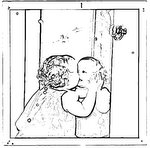Top Ten Signs Your Degree is Fake
1 Your chosen university is not accredited. To learn if your college or university holds recognized accreditation check out these databases to search for your school or perspective school.
The accreditation database is brought to you by the U.S. Department of Education’s Office of Post secondary Education retrieved at: http://www.ope.ed.gov/accreditation/
The Council for Higher Education Accreditation (CHEA) database lists approximately 7,000 degree-granting and non-degree-granting institutions and over 17,000 programs that are accredited by United States accrediting organizations retrieved at: http://www.chea.org/search/default.asp
Simply scroll down to bottom of page and agree with disclaimer and search for your school.
2. The school you are attending or planning to attend is accredited but not by an agency recognized by the Council on Higher Education Accreditation. Chea's main web site can be retrieved at: http://www.chea.org.
Internet degree mills are "accredited" by bogus agencies that have no authority to accreditate and usually have created the bogus agencies themselves.
3. Admission criteria consist entirely of possession of an identification card or license and a valid Visa or MasterCard. Previous academic record, grade-point average and test scores are deemed irrelevant and you can often be accepted without having to provide proof of graduation from high school or transcripts .
Here is an example of documentation that is needed to be accepted by Lamar State College retrieved at: http://www.lsco.edu/Students/Students_Who_May_Apply.htm , however, for the online student they must sign a transcript request that is sent to the school they attended which is sent back to perspective college or University . If you are sending a copy of your diploma or G.E.D. certificate buyer beware applies .
4. You are offered a college degree based on a "review" of your faxed resume for life time credit. No valid distance-learning university or college in the United States will award a graduate degree based solely on a review of career experience. Accredited undergraduate programs typically limit credit for experience to a maximum of 10 courses or 30 semester credits this is approximately on year of a four-year degree.
5. You are promised a diploma within 30 days of application regardless of your status upon entry. This is typically a Degree mill which is in the business of selling paper.
6 You are promised a degree in exchange for a lump sum: typically, $2,000 for an undergraduate degree, $3,000 for a graduate degree sometimes more. Universities charge per credit or per course tuition and fees. Some online school prorate book cost into the tuition.
7. Your prospective online university has multiple complaints on file with the Better Business Bureau. The bureau records consumer complaints about online degree mills. Visit BBB online at http://www.bbb.org. Look not only for your state but also the different states that the school claims it has a campus in.
8. Your online "admission counselor" assures you that online universities can't be accredited by CHEA-recognized agencies. Most online schools also have separate brick and mortar facilities as well and offer both traditional ground campus education and online. Do not take an admission specialist word, do your homework.
9. A Schools website will also offer invaluable clues. Look for the list of Instructors and their bios. If there is no list this is a major problem also look at where these Instructors graduated from, and what degree they hold. If Instructors hold a Associates Degree they are not in a position to teach legally.
10. Overseas university offering online degrees almost exclusively to U.S. citizens but is located in a foreign country, do not be fooled by online degree and diploma mills. Many maintain impressive Web sites and advertise heavily online yet this does not make them legitimate. Take the time to verify accreditation by an agency that is recognized by the Council on Higher Education Accreditation.
Remember it is your money and time you will waste if you don't check it out.
Check accreditation of the online degree at US Department of Education http://www.ope.ed.gov/accreditation/Search.asp
Check legitimacy of the Internet University at the Council for Higher Education Accreditation
Write to the Diploma Mill Police that authenticates Internet Institutes of Education.http://www.geteducated.com/services/diplomamillpolice.asp
Friday, September 28, 2007
Top Ten signs your degree or school is fake!
Subscribe to:
Post Comments (Atom)

No comments:
Post a Comment